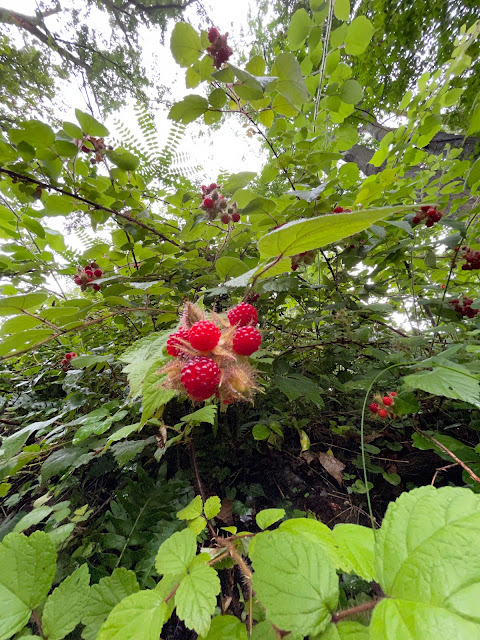Writing on Food, Foraging, and Climate Change
 |
| Wild wineberries, ripe for the picking! |
by douglas reeser, July 21, 2021
I'm sitting here in the forest of south eastern Pennsylvania, less
than a 2 hour drive from the mid-Atlantic coast. It's an idyllic space,
one that I am lucky and privileged to occupy. It was once indigenous
land, home to the Lenape for thousands of years before Europeans began
pushing them off these lands in the 1600s. For the most part, it's the
same story across the United States. But, while the story of the
indigenous people that were here before must be told and remembered,
that is not the story I am writing about here.
I've been researching and writing about foraging off and on for about eight months now, and my reading has taken me in directions that I was not originally expecting. And these tangents have been mostly paralyzing, leaving me unsure of what my story actually is. Foraging necessarily puts one in direct interaction with nature, with the world of plants and fungi most obviously, but also the many other insects and animals that work in conjunction with that world of plants. As one begins on the path of foraging, it becomes quickly apparent that the wider natural world is working with each other towards reproduction and survival. Nothing can exist without the rest of it all.
And so, when one is
thinking about foraging, one is actually thinking about the wider
natural world. And it is this type of tangent that has hindered my
ability to focus on my topic. My reading list has widened to include
that wider natural world, and it's near impossible not to drift into the
literature and daily realities of climate change. Just in the past
couple of weeks there have been numerous events that one could consider
unusual or extreme. One such event was a "heat dome" parked in the Pacific Northwest that brought record breaking temperatures to the region along with the death of around one billion marine animals. There are even pictures of ocean boiled mussels on the coast near Vancouver.
Not long after that intense heat event, massive floods hit Germany and Belgium that have killed nearly 200 people and caused countless euros in damage. Scientists view the changing climate as a major driver in floods such as these that are now occurring roughly twice as often as seen historically. Just days later, torrential rains and massive flooding hit central China, where a year's worth of rain fell in just three days. Chinese officials claim they haven't seen rain like this in 1000 years.
Closer to home, in the mid-Atlantic region of the US, there is a mysterious illness causing a mass die-off of song birds. With the cause proving elusive, people have been asked to remove all bird feeders and bird baths from around their homes in an effort to halt the unknown illness from spreading. And just in the last few days, here in Pennsylvania, we've been under an air-quality warning due to the wildfires burning on the west coast and in Canada. The smoke in our air is from fires that started while that same "heat dome" was causing so many other problems.
Such extreme environmental events are happening with such frequency that it's difficult to keep up. For my own sanity, it's probably not a productive effort anyway. But it brings me back to the issue of writing, reading, and thinking about foraging. Nothing can exist without the rest of it all. And when the rest of it all is apparently in extreme flux, where does that leave the practice of foraging? In fact, scientists are already observing a large-scale re-arranging of how plants are distributed. While the plant movement is still relatively subtle, scientists anticipate more noticeable changes in the coming decades, with the effects particularly evident in agriculture. That's our food source.
And so it comes back around full circle, and perhaps begins to show a path forward in thinking about all of this. Most simply, foraging is about finding food, and it appears that climate change will impact what food grows where. It's all connected, and it's all changing. What does that mean for the future of food, the future of foraging, the future of us?
Comments